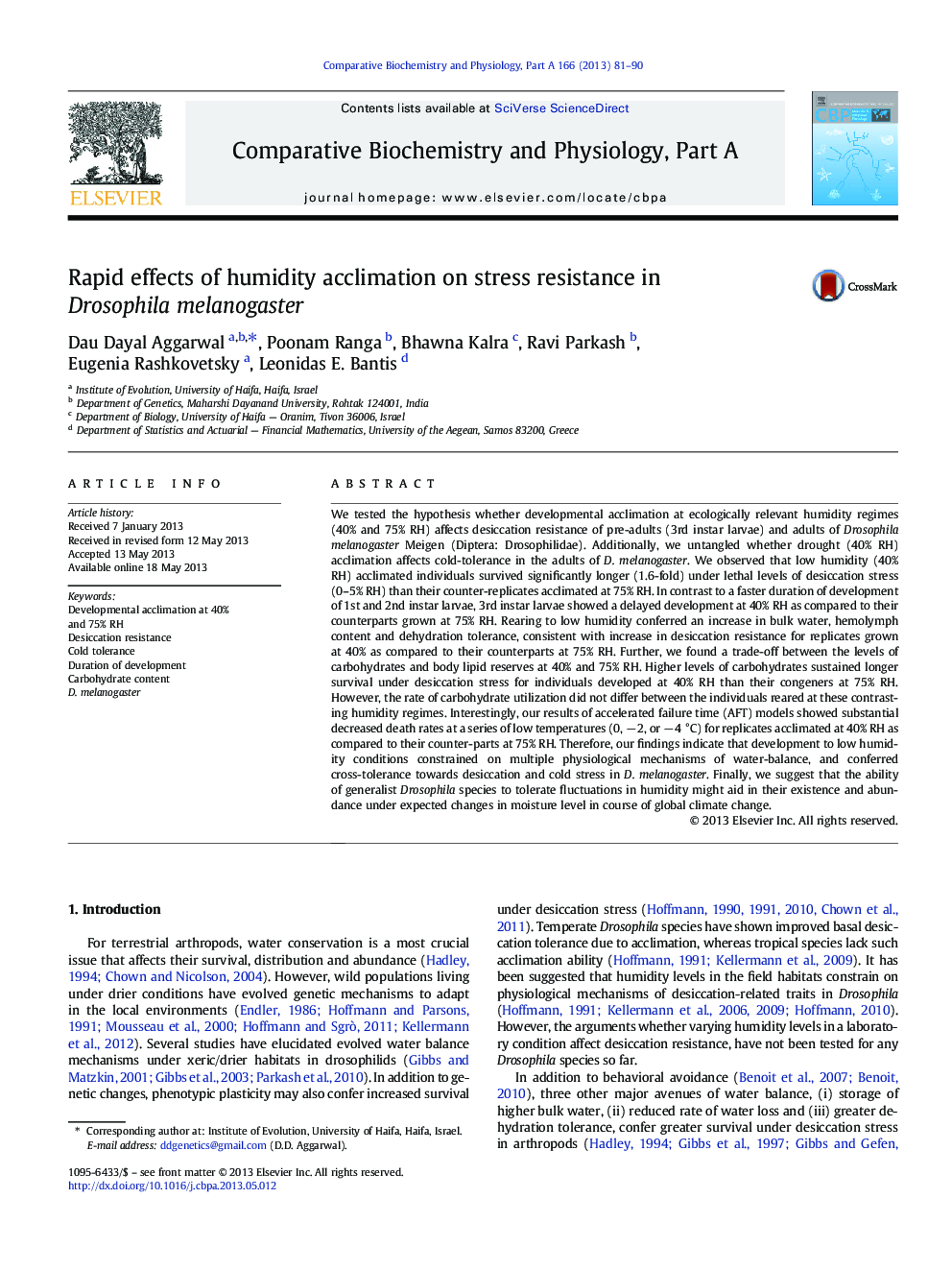| کد مقاله | کد نشریه | سال انتشار | مقاله انگلیسی | نسخه تمام متن |
|---|---|---|---|---|
| 10818882 | 1060271 | 2013 | 10 صفحه PDF | دانلود رایگان |
عنوان انگلیسی مقاله ISI
Rapid effects of humidity acclimation on stress resistance in Drosophila melanogaster
دانلود مقاله + سفارش ترجمه
دانلود مقاله ISI انگلیسی
رایگان برای ایرانیان
کلمات کلیدی
موضوعات مرتبط
علوم زیستی و بیوفناوری
بیوشیمی، ژنتیک و زیست شناسی مولکولی
زیست شیمی
پیش نمایش صفحه اول مقاله

چکیده انگلیسی
We tested the hypothesis whether developmental acclimation at ecologically relevant humidity regimes (40% and 75% RH) affects desiccation resistance of pre-adults (3rd instar larvae) and adults of Drosophila melanogaster Meigen (Diptera: Drosophilidae). Additionally, we untangled whether drought (40% RH) acclimation affects cold-tolerance in the adults of D. melanogaster. We observed that low humidity (40% RH) acclimated individuals survived significantly longer (1.6-fold) under lethal levels of desiccation stress (0-5% RH) than their counter-replicates acclimated at 75% RH. In contrast to a faster duration of development of 1st and 2nd instar larvae, 3rd instar larvae showed a delayed development at 40% RH as compared to their counterparts grown at 75% RH. Rearing to low humidity conferred an increase in bulk water, hemolymph content and dehydration tolerance, consistent with increase in desiccation resistance for replicates grown at 40% as compared to their counterparts at 75% RH. Further, we found a trade-off between the levels of carbohydrates and body lipid reserves at 40% and 75% RH. Higher levels of carbohydrates sustained longer survival under desiccation stress for individuals developed at 40% RH than their congeners at 75% RH. However, the rate of carbohydrate utilization did not differ between the individuals reared at these contrasting humidity regimes. Interestingly, our results of accelerated failure time (AFT) models showed substantial decreased death rates at a series of low temperatures (0, â 2, or â 4 °C) for replicates acclimated at 40% RH as compared to their counter-parts at 75% RH. Therefore, our findings indicate that development to low humidity conditions constrained on multiple physiological mechanisms of water-balance, and conferred cross-tolerance towards desiccation and cold stress in D. melanogaster. Finally, we suggest that the ability of generalist Drosophila species to tolerate fluctuations in humidity might aid in their existence and abundance under expected changes in moisture level in course of global climate change.
ناشر
Database: Elsevier - ScienceDirect (ساینس دایرکت)
Journal: Comparative Biochemistry and Physiology Part A: Molecular & Integrative Physiology - Volume 166, Issue 1, September 2013, Pages 81-90
Journal: Comparative Biochemistry and Physiology Part A: Molecular & Integrative Physiology - Volume 166, Issue 1, September 2013, Pages 81-90
نویسندگان
Dau Dayal Aggarwal, Poonam Ranga, Bhawna Kalra, Ravi Parkash, Eugenia Rashkovetsky, Leonidas E. Bantis,